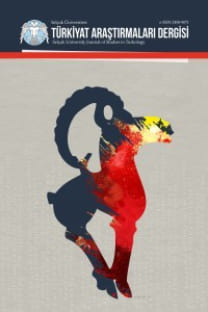EZEN AYAĞA YILANIN ÖCÜ: NAMIK KEMAL’İN İNTİBAH ROMANINDA OTORİTER SÖYLEMİN SÖYLEŞİMSEL ALANA ÇEKİLMESİ
Namık Kemal’in Intibah romanı bir karakterin anlatıcının okuyucuyu yanlış yönlendirmesine karşı sözlü mücadelesini ele alır. Romanın iki ana karakterinden biri olan Ali Bey Çamlıca’da gezinirken Mehpeyker adında çok güzel bir kadınla karşılaşır ve ona aşık olur. Romanın anlatıcısı Mehpeyker’in ‘temiz’ bir geçmişe sahip olmadığını söyler ve Ali Bey’e uygun bir eş olmadığını okuyucuya inandırmak için elinden geleni yapar. Ancak anlatıcının bütün çabasına karşın okuyucu Mehpeyker’e sempati duyar, çünkü Mehpeyker davranış ve söylemiyle anlatıcının anlatımından farklı olduğunu gösterir. Böylece ötekiyi temsil eden Mehpeyker’in söylemi anlatıcının otoriter söyleminin merkezileşme çabasını sekteye uğratır. Bu çalışma, anlatıcı ve Mehpeyker arasındaki ilişkiyi ve mücadeleyi Rus kuramcı Mikhail Bakhtin’in edebiyat kuramından hareketle incelemektedir. İntibah’ta anlatıcı baskıcı eril söylemi, Mehperker de buna karşı mücadele eden dişil söylemi temsil ettiği için çalışmada Bakhtin’in feminist yorumları da kullanılmıştır. Intibah’ta eril söylemi zayıflatan ve okuyucu nazarındaki inandırıcılığını bozan Mehpeyker’dir. Bu çalışma, anlatıcının otoriter söylemini ve ona karşı Mehpeyker’in bozan söylemini ele almaktadır.
THE SERPENT’S FANGS EMBEDDED IN THE HEEL: THE DIALOGIZATION OF AUTHORITY IN NAMIK KEMAL’S INTIBAH
The Turkish novelist Namık Kemal’s Intibah indicates how a character struggles againstmisrepresentation. In the novel, Ali Bey, a 22-year old educated boy, meets a very beautiful woman,whose name is Mehpeykey, as he walks in Çamlıca, and he falls in love with her. The narrator saysthat Mehpeyker does not have a virtuous background and he does his utmost to make the addresseehate her and believe that she is not a suitable partner for Ali Bey. However, the reader interestinglysympathizes with her throughout the novel because with her speech and actions Mehpeyker representsherself differently from what the narrator says about her. The present article studies the relationshipand struggle between the narrator’s and Mehpeyker’s discourses based on the theory of the Russiancritic Mikhail Bakhtin. Since in Intibah the narrator’s discourse appears as patriarchal discourse andanother’s word as femininity which struggles against misrepresentation by patriarchy, a feministreading of Bakhtin is also employed in the analysis of the novel. In Intibah Mehpeyker represents thevoice of the other that disseminates the male authority of the narrator.
___
- Akyol, S. (2006). Intibah’a dair. In Intibah. Ankara: Ozgur Yayinlari.
- Bakhtin, M. (1981). Dialogic imagination. Michael Holquist (Ed.). Austin: University of Texas Press.
- Bakhtin, M. (1984). Problems of Dostoyevsky’s poetics. Minneapolis: University of Minnesota Press.
- Banfield, A. (2000). From unspeakable sentences: narration and representation in the language of fiction.” Michael McKeon (Ed.), Theory of the novel (515-536). Baltimore & London: The Johns Hopkins UP. .
- Bauer, D. (1988). Gender in Bakhtin’s carnival. Robyn R. Warhol & Diane Price Herndl (Ed.), Feminisms: an anthology of literary theory and criticism (671-684). New Brunswick-New Jersey: Rutgers University Press.
- Cassirer, E. (1953). The philosophy of symbolic forms: language. R. Manheim (Trans.). New Heaven: Yale University Press.
- Cohn, D. (2000). Transparent minds: narrative modes for presenting consciousness in fiction. M. McKeon (Ed.), Theory of the novel (493-514). Baltimore & London: The Johns Hopkins UP.
- Hernall, D. P. (1991). The dilemmas of a feminine dialogic. Dale Bauer & S. Jaret McKinstry (Ed.), Feminism, Bakhtin, and the dialogic (7-24). Albany: State University of New York Press. 7-24.
- Enginün, İ. (2006). Yeni Türk edebiyatı/ Tanzimat’tan Cumhuriyet’e. Istanbul: Dergah Yayınları.
- Foucault, M. (1995). Discipline & punish. New York: Vintage Books.
- Gilbert, S. & Gubar, S. (1979). The madwoman in the attic. New Haven: Yale University Press.
- Kaplan, M. (1997). Türk edebiyatı üzerinde araştırmalar. Istanbul: Dergah Yayınları.
- Kemal, N. (2006). Intibah. Ankara: Ozgur Yayinlari.
- Moi, T. (1985). Sexual/textual politics. New York: Methuen
- Moran, B. (1983). Turk romanına eleştirel bir bakış I. İstanbul: Iletisim Yayincilik.
- Tanpınar, A. H. (2001). 19cu asır Türk edebiyatı tarihi. Istanbul: Çağlayan Kitabevi.
- Uçman, A. (2006). Namık Kemal. Prof. Dr. Ismail Parlatır (Ed.), Tanzimat edebiyatı (201-288). Ankara: Akçağ Yayınları.
- Voloshinov, V. N. (1973). Marxism and the philosophy of language. L. Matejka & I. R. Titunik (Trans.). Cambridge: Harvard University Press.
- ISSN: 1300-5766
- Yayın Aralığı: Yılda 3 Sayı
- Başlangıç: 1994
- Yayıncı: Selçuk Üniversitesi
